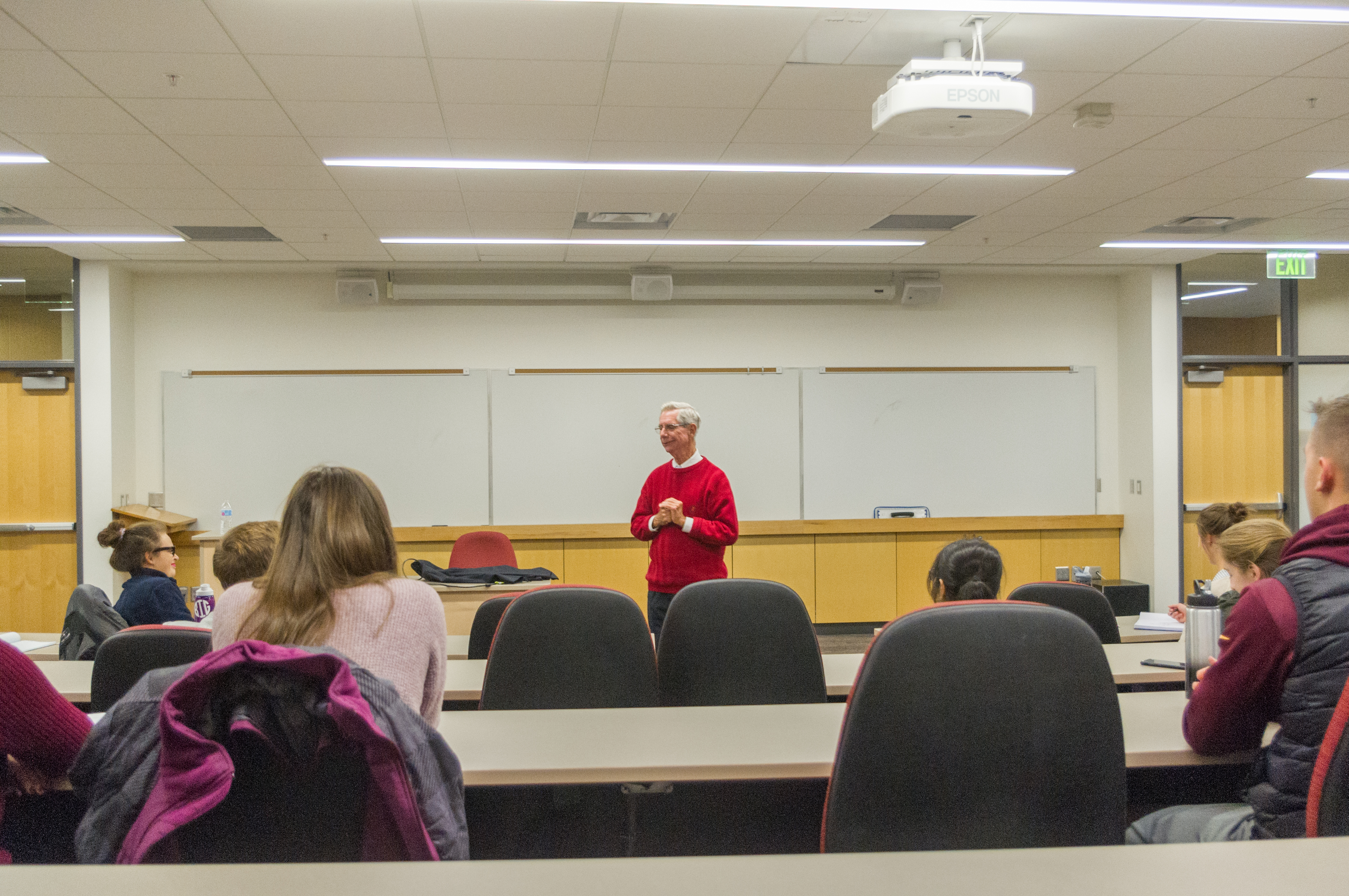Last Thursday, speechwriter Craig Smith delivered a lecture to students and faculty of Gustavus about his recent publication, Confessions of a Presidential Speechwriter.
He was introduced as “an incredibly wonderful rhetorical scholar [who has] published over 60 peer reviewed scholarly articles over his career… and over 20 books” by his old friend and Gustavus visiting faculty member Dr. Brandon Anderson.
In his lecture, he describes his journey to writing speeches for Republican presidents such as Gerald Ford and George H.W. Bush.
He obtained degrees from UC Santa Barbara and Penn State before starting an internships at CBS News as the only graduate student.
“My job was to just put my head down, call delegates up, find out what their important issues were, who they were voting for, how this was all gonna work out,” Smith said in the lecture.
He had been promoted to a writing position for CBS and continued on to finish his doctorate before working as a professor at San Diego State University and the University of Virginia.
Eight years later, after listening to a “dreadful” speech by President Ford, he wrote a five-page, single-spaced critique of the speech and sent it to Ford.
After one week, he was offered the position of presidential speechwriter at the White House.
“I discovered that I was the first person out of our field, communication studies, to be considered for a speechwriter. The presidents were hiring journalists, they were hiring political science professors, history professors… so I was the first one with this skillset,” he said about his interview process.
His submission to Ford’s anonymous bicentennial project contest won and provided him with some more credibility.
Afterwards, he wrote speeches for Ford and coached his debates against Carter, which helped Ford win over the media until the second debate which lost him the presidency
After losng the election against Carter, Smith went back into teaching at the University of Alabama at Birmingham, where he was the founding chair of a department.
He also got on the Alabama Republican Central Committee and “began to work on the project of converting conservatives in Alabama from the democratic party to the republican party.”
This work eventually brought him back to Washington D.C. where he became the Director of Senate Services for the Republican caucus of the United States Senate.
In the meantime, while raising funds for the Republican Party, Smith invited George H.W. Bush to come in and speak.
In his lecture, he mentioned how Bush “had been the ambassador of China, the head of the National Republican Committee, a congressman, reelected twice without opposition, and a perfect gentleman and a very bright guy.”
After evaluating Bush’s speech, he was offered a job writing speeches for him in 1988 and 1992.
“Speechwriting is very important… obtaining a rhetorical skillset is very important and it can make you adaptable. You can preview into a life you never dreamed of. I’ve been one of the luckiest persons in the world in that regard,” Smith said.
Political Science Professor, Kate Knutson asked Smith to “speak a little bit about some of the tendencies from republican presidential speeches that maybe play at some of the biases that we have.”
Smith explained the shift from campaigning that was “ciceronian, reasonable, about civic virtue,” to Andrew Jackson’s bandwagon campaigns: “There was this major shift to a more patriotic, emotional kind of campaign,” he said.
He said the Trump campaign changed presidential rhetoric because of the bragging and the branding.
“There was the good branding. ‘Make America Great Again,’ that was very effective. But… one of the things that made that effective was it was an open ended branding. ‘Make America Great Again’ implies that America was great before… And that allowed people to just flood in with whatever they wanted, to put in their version of whenever America was great,” he said. “That kind of thing kind of shifted presidential rhetoric to a kind of populist, nationalist [view]… that played to certain prejudices.”
Knutson asked, “is political rhetoric dead?”
Smith explained that rhetoric can be used for good or evil: “We teach these high standards. Use evidence, build an argument, have ethos, have your credibility. And I agree with all of that. But sometimes you need to break through on the emotional level and then reinforce it with these other strategies,” he said.
“One of the things I’d learned over time is a good narrative is better than a good argument. A good story trumps a good argument.”
Smith has been awarded the distinguished 2014 Bruce E. Gronbeck Political Communication Research Award for his book Confessions of a Presidential Speechwriter, meaning his work was the best political communication book of the last two years.
He also received the Douglas W. Ehninger Award for lifetime achievement in rhetorical scholarship by the National Communication Association in 2010, according to the California State University, Long Beach website.
He was the founder and former president of the Freedom of Expression Foundation and is currently the Professor of Communication Studies at California State University, Long Beach, and the Director Emeritus of the Center for First Amendment Studies.
